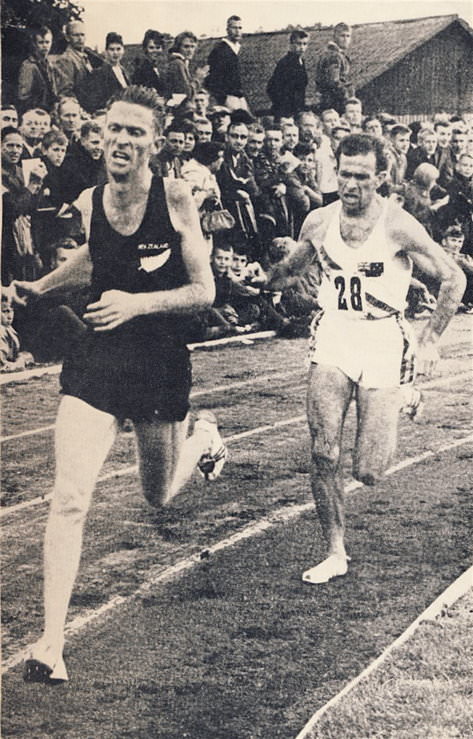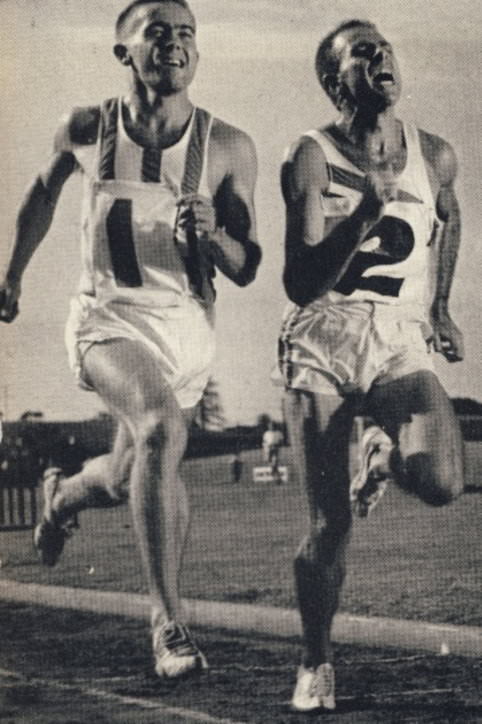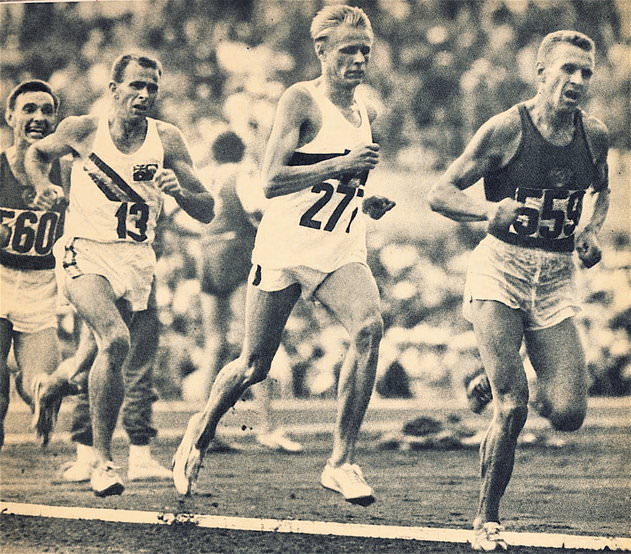Dave Power: Profile
1928-2014
One of the greatest Australian runners between 1958 and 1962, Dave Power was overshadowed by the world records and gold medals of Herb Elliott and Murray Halberg. Power never set a world record, but his competitive record in major games has rarely been matched: two gold medals in the 1958 Commonwealth Games, a bronze and a fifth place in the 1960 Olympics and two silver medals in the 1962 Commonwealth Games. It is worth noting that he achieved all this in his thirties. For Power, the road to the top was a long one; he competed in his first national championships back in 1950-1. When many would have abandoned the rigorous training he undertook, Power’s joy of running and appetite for success kept him going. His tenacity and courage were admired by many of his peers.
 |
| This photo of Dave Power chasing Murray Halberg shows the essence of his character. |
Athletics was just one of many school sports he played in his youth. He did run the 100 and 220 when 16, but he also showed promise as a winger in football and swam well enough to win a combined-schools title. Inspired by a good school coach, he turned to middle-distance running after school and ran 4:22.9 for the Mile in the 1950-1 season. In 1954 he ran 1:54 for 880, won a state title, and placed 3rd in both the 880 and Mile in the Australian championships. Then the 26-year-old badly injured his achilles tendon in a spiking accident. This changed his focus from 880/Mile to longer distances. Still self-coached, he started to do lots of mileage and cross-country running. But he did get some advice from coach Jack Pross: “He didn’t alter my training pattern,” Power told Brian Lenton, “but he helped me in other ways of keeping my body fit—weight training gymnasium work, what to eat and drink, vitamin intake, etc.” ("Dave Power," The Brian Lenton Interviews, p. 96)
This change of focus soon brought dramatic results. He won the Australian cross-country title in 1955, relishing the sand-dune terrain of the Perth course. On the track he was no match for the top Australian runners like Lawrence and Stephens, but he did make the Australian team for the Melbourne Olympics.
Power ran a fine race in the Olympic 10,000. He held on to a group that included Kovacs, Norris, Krzyszkowiak and Chernyavsky for 15 laps before dropping back. However, he made up one place at the tape, just catching Gordon Pirie for seventh place and reducing his PB from 30:02.4 to 29:49.2. This was the first of many times that Power showed he could perform well in major competition.
Brian Lenton’s article provides a winter and a summer week from Power’s 1956 training diary. He was training three times a day in the winter (except for a race day) and twice in the summer. In the winter week he covered 110 miles, running on roads, beaches and grass. Mostly he did straight runs, but the week included a 6xMile session and a 36x440 session. The summer week just before his 10,000 in the Melbourne Olympics included sessions with Zatopek and Mimoun—both heroes of his. He ran the following interval sessions: 8xMile, 40x440, 20x40 (62 seconds), 12x400 followed by 6x220, 40x400 followed by 4x220. For this summer week he ran 120 miles in 13 sessions.
 |
| Dave Power (right) battles Albie Thomas. |
A continued rigorous training regime bore fruit 18 months later in the 1958 Empire and Commonwealth Games, where he won gold medals in the 10,000 and Marathon. At these games he earned the title “The Kuts of Cardiff.” For the 10,000 he was motivated by the presumptuous way the English considered Stan Eldon a shoe-in for victory. After Eldon had led in the early laps, Power took over just before the halfway point, passing three miles in 14:14.6. As he pushed the pace, Eldon tried desperately to stay in contact, but by 14 laps he was exhausted and fell far back. By the bell Power had dropped everyone except Merriman. On the last lap, the Welshman tried three times to pass him, but he held on resolutely to win with a one-second advantage in 28:47.8.
This same determination not to give up the lead was evident n the marathon. With his feet already blistering, Power took the lead at 12 miles from Barnard and managed to keep the South African at bay for the rest of the race, although Barnard was never far behind and even got within 20m just outside the stadium. Power had an 11.8 second advantage at the tape, finishing with his shoes full of blood in 2:22:45.6. He had to be carried to the podium and a week later was still unable to walk normally. No wonder Herb Elliott said of the Cardiff games, “I was inspired by Dave Power…as I always am by courageous runners.” (Golden Mile, p.87)
The 30-year-old now showed he could win big races. And Percy Cerutty, who had advised Power before, spent a lot of time convincing him he was a world-beater. “Up until then I’d been playing second fiddle to the likes of Al Lawrence and Albie Thomas,” Power told Brian Lenton. “Once Perce convinced me I was every bit as good as them, if not better, I started winning races. I’ll always owe Percy in that respect.” (Lenton Interviews, p. 96)
Power now looked forward to the Rome Olympics, where the competition would be much stiffer, with a more positive attitude. He was entered for three events. First was the 5,000, his weakest event. He had an impact on this race, taking the lead on the ninth lap and reducing the leading pack to seven. But when Halberg made his effort, Power could not go with him, nor with the chasing trio of Grodotzki, Zimny and Janke. Still he held on to fifth place with a 13:51.8 clocking, a magnificent performance.
He made a similar move in the 10,000, this time with seven laps to go, which he later said was “too soon.” He soon reduced the lead pack to five, and then the Russians helped with the pacemaking. No one could answer Bolotnikov’s final burst, but behind him Power finished really strongly, passing Desyatchikov and almost catching Grodotzki. He had won the bronze, and with a 28:37 clocking he had broken his PB by 54 seconds. After two great runs on the track, Power was feeling very confident about the Marathon. Sadly, he contracted flu and was unable to start. He told Brian Lenton it was “a crushing disappointment,” as he believed his “chances in the marathon were better than the 10,000.” (Lenton, p.101)
 |
| Rome Olympic 5,000. Power trails Bolotnikov and Grodotzki. |
Now 32, Power was still hungry. He consulted with New Zealand coach Arthur Lydiard and changed his training by upping the aerobic work over the anaerobic. He used Lydiard’s ideas until he stopped competing at the top level in 1964.
His next major target was, of course, the 1962 Empire and Commonwealth Games hosted by his own country in Perth. He competed there as the reigning champion. In the 10,000 he again faced John Merriman, who had given him such a race in Cardiff in 1958. Also a concern or him was Kiwi Barry Magee, who was running really well. Then there was a precocious 19-year-od Canadian called Bruce Kidd, who had recently burst onto the North American scene. After a cautious start because of the heat, Power used his old tactic of pushing the pace with six laps to go. Only Kidd was able to go with him. After tracking him for four laps, Kidd made his move with 880 to go. Power had no answer, losing 7.4 seconds by the tape. So the 34 year-old had to give way to a 19-year-old. Still a silver medal was still a great achievement. Then came the marathon in which European champion Brian Kilby was competing. And it was Kilby who took charge of the race at 15 miles and ran the rest of the race on his own. Power was second, 58 seconds behind and well ahead of team-mate Rodney Bonella by 1:58. His 2:22:15 was a PB. “I underestimated Kilby’s ability to stay and let him go it alone,” he admitted. “But I let him get too far in front and left myself an impossible task.” (Quoted in Deek by Rob de Castella, p.18)
Dave still had one good marathon in him, running 2:22 for third in the 1963 Tokyo Marathon. But he was unable to make the 1964 Australian Olympic team. “I think Father Time had caught up with me by that stage,” he admitted to Brian Lenton. “I was starting to slow down a bit.” (Lenton, p. 89)
Dave Power’s personality was summed up well by Herb Elliott: “Dave Power…is perhaps the most lion-hearted athlete I’ve known…. Although it was against his nature to be ferocious, his patience and powers of endurance were qualities Percy [Cerutty] felt should be paying higher dividends. And ultimately they did.” (The Golden Mile, p.155) Power’s career is a story of long-term perseverance and unusual courage. He was universally admired for his grit. Even though he ran a mile in 4:00.2, he was never confident in his speed: “I was primarily a front runner…. There were very few races when I wasn’t up the front trying to push the pace. It was probably because I didn’t have a lot of confidence in my finishing ability…. I never had the confidence of someone like Albie [Thomas] who was basically a sitter and kicker.” (Lenton, p. 102) 
Note: I am indebted to Brian Lenton's wonderful material on Dave Power in his Brian Lenton Interviews, which unfortunately is very hard to find.
5 Comments